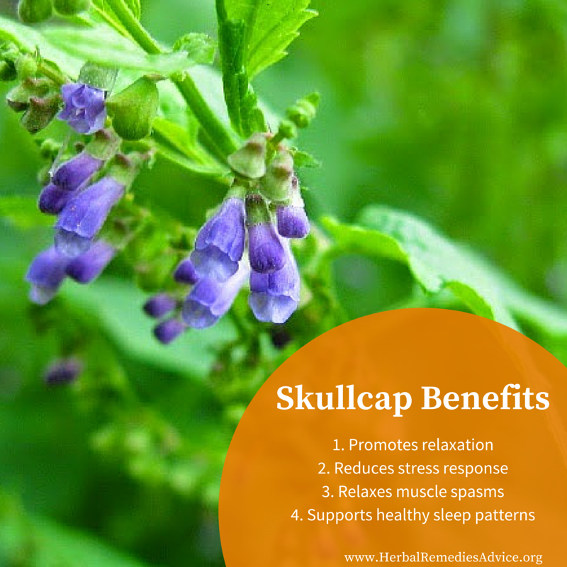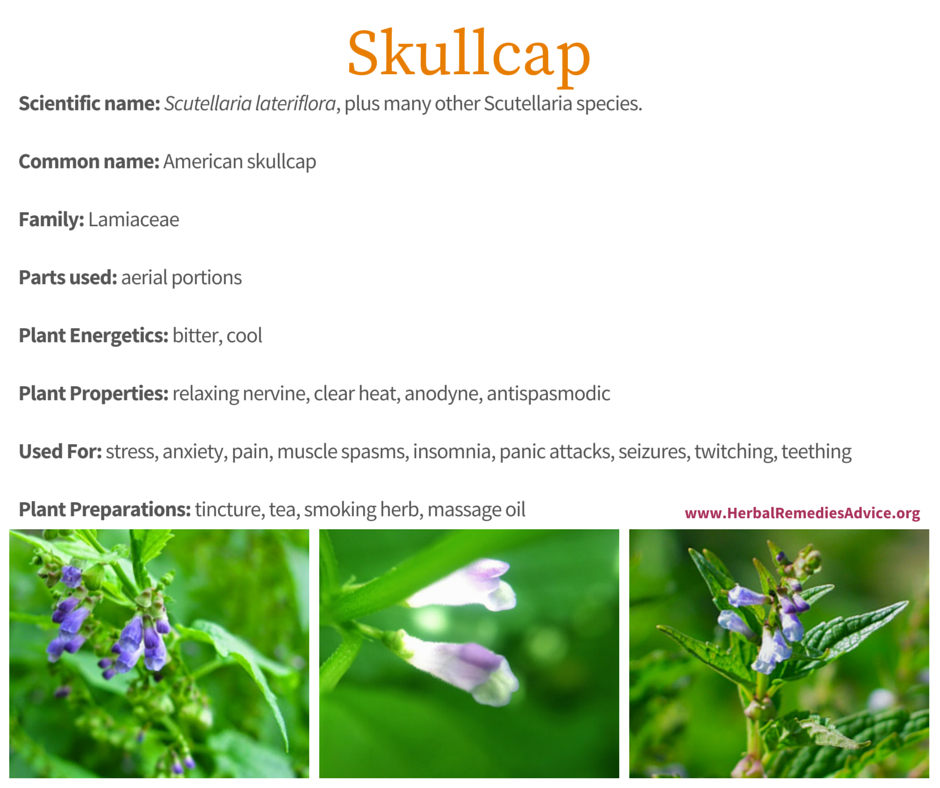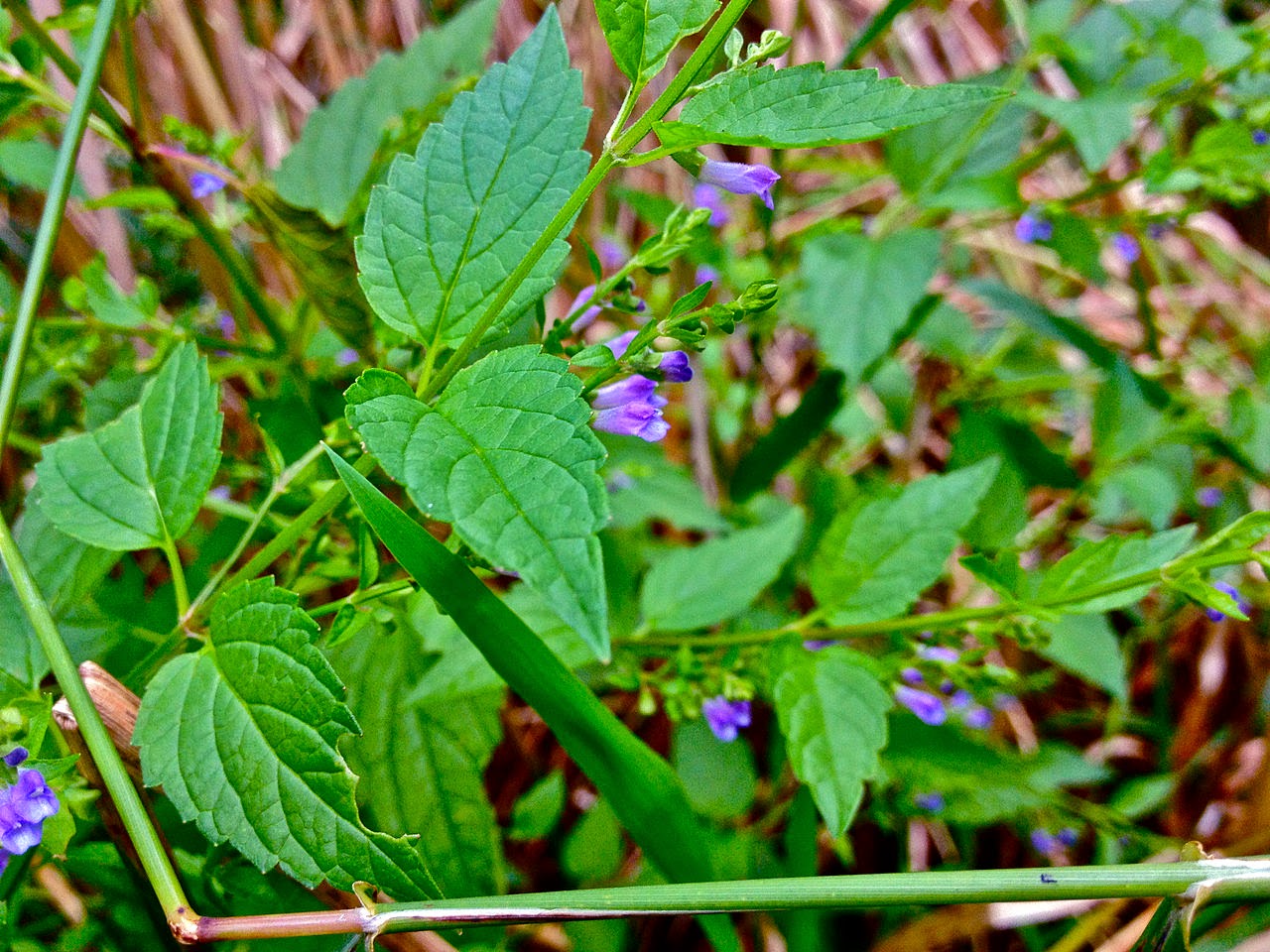Get weekly tips, recipes, and my Herbal Jumpstart e-course! Sign up for free today.

Skullcap Herb: A Restorative Relaxing Nervine
Share this! |
|
Skullcap herb is an amazing plant for stress, tension, anxiety, nervousness and panic attacks. This article will give an herbalist's perspective on this plant's uses and health benefits as well as share tips for using the tincture and the tea. We'll even look at the effects of smoking this interesting plant.
Wondering where to buy skullcap herbal tea? Throughout this article I have links to my favorite places to buy skullcap herbal tea, tincture and even a place to buy herbal smoking blends. Some of these links are affiliate links.
Energetically, american skullcap is a bitter herb with cooling properties, making it most useful for those with signs of heat. While doing research for this article I found many herbalists had favorite skullcap uses and decided to include many of those pearls of wisdom in this article.
Skullcap Herb Uses
Skullcap for Anxiety
If I were pressed to simply list one application for skullcap it would be its ability to relieve stress and anxiety. It works well in acute situations and can be taken over time to decrease chronic stress (along with lifestyle modifications of course).
It works well for acute and sudden onset anxiety or panic attacks. For people susceptible to sudden onset anxiety or panic attacks, fresh skullcap tincture can be kept on them at all times.
Experienced herbal medic, Sam Coffman, shares his reliance on skullcap herb for shock-related anxiety.
Skullcap (Scutellaria spp.) and Passionflower are two that have never failed me as a formula to help someone cope quickly with shock-related anxiety. - Sam Coffman, Plant Healer Magazine 11
Not just for acute cases, skullcap can be taken over time as a nerve tonic to support nervous system health in people who have been through prolonged periods of stress and feel like their nerves are constantly on edge. Again, I like skullcap tincture for this and I often combine it with a fresh tincture of milky oats (Avena sativa).
As herbalists we have many relaxing nervines that are specific to anxiety. However, many of these herbs also promote drowsiness (e.g., Valerian (Valeriana officinalis), Kava (Piper methysticum), Hops (Humulus lupulus)). One of the benefits of skullcap is its ability to relieve acute anxiety without causing a lot of drowsiness.
Skullcap is often best for those with signs of heat and excitation. This can manifest in different ways but some common characteristics include people who are easily overheated, who are more irritable in hot weather, tend to have “type A” personalities, a red tongue (possible yellow coating) and a fast or intermittent pulse.
Sean Donahue explains this further:
The
excited tissue state is marked by overstimulation, hyper-reactivity,
processes moving too fast, increased metabolism, and increased heat. The
most common presentation I see of mental and emotional excitation is
irritability and anxiety brought on by overstimulation, made worse by
heat and brightness. Skullcap (Scutellaria lateriflora) works wonders in
calming this kind of excitation. The tincture
will do nicely, but smoked Skullcap will enter the bloodstream more
quickly. It combines nicely with Passionflower (Passiflora incarnata)
when circular thinking or spiraling thoughts are part of the picture.
- Sean Donahue, Plant Healer Magazine 12
Skullcap Herb Uses for Muscle Twitching and Spasms
Skullcap is also admired for its ability to reduce muscle twitches and involuntary muscle spasms. Many entries in the Eclectic literature state it was a favorite for “chorea” (involuntary muscle spasms) and was often combined with black cohosh (Actaea racemosa) for calming these spasms.
It is also used for premenstrual tension and cramping, TMJ pain and restless legs.
Scullcap herb (Scutellaria lateriflora) – is a superb nervine that is especially effective for nervous people who develop tremors, palsies, nervous tics, bruxism, and muscle spasms. For people with ADHD it is indicated for irritability, repetitive movements, outbursts of anger, and oversensitivity to external influences. For this last condition use it with Fresh Oat, Rose petals, Sweet Birch, and Holy Basil. Scullcap needs to be used in significant doses over long periods of time, but it can be very effective when used correctly. - David Winston, AHG Proceedings 2013
Skullcap Herb Uses for Insomnia Due to Circular Thinking
Skullcap for sleep: As a relaxing nervine, skullcap herb is commonly used to relax a busy mind at night to promote sleep. Another insomnia indication is for someone who has tense muscles and can’t relax enough naturally to fall asleep. Restless legs at night could also be calmed with skullcap (though I would also consider magnesium in these cases).
The skullcap tincture does not seem to be a strong outright sedative, but is often combined with stronger sedative herbs like Valerian (Valeriana officinalis).
Taking a tip from Paul Bergner I’ve found that a strong infusion of skullcap tea can be a stronger sedative than the tincture, which gives more overt feelings of drowsiness. If you want to use skullcap for sleep, make a strong skullcap herbal tea!
I see it most useful for people who constantly need to take charge. They make constant contingency plans and feel personally insulted when things don’t go their way. They may have insomnia and cannot initially fall asleep due to thinking about all the things they could have done differently that day. - 7Song, Skullcap Monograph
Here's a nighttime tea blend from Mountain Rose Herbs that includes skullcap tea as well as passionflower, hibiscus, lemon balm, hops, valerian and lavender.
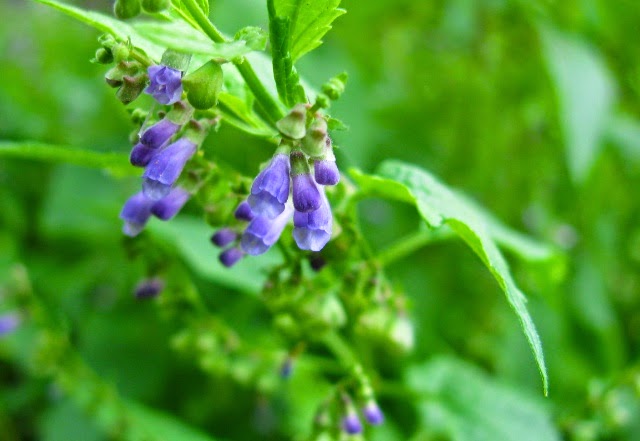
Skullcap Herb Uses for Pain
Skullcap is a mild anodyne herb and is particularly suited to relieving pain due to muscle tension. Historically it was used for numerous types of pain, including toothaches and menstrual pain. It was also used for irritability brought on by the pain of teething.
Skullcap Herb Preparations
Skullcap can be prepared as a tincture, tea, oil infusion or even smoked. Here are some basic suggestions for each preparation.
Skullcap Tincture
Skullcap extract is best tinctured when fresh. I prefer 95% alcohol at a 1:2 ratio but have seen other herbalists use as low as 40% alcohol. The standard recommended dose is 3–5 ml three times per day. I have not seen adverse effects when using larger dosages. As always, it’s best to start with the lowest dose and slowly work up until the individual’s dosage is found.
Skullcap Herbal Tea
A strong tea of skullcap is strongly sedative. If you are drinking skullcap herbal tea for sleep then drinking a lot of liquid before bedtime isn’t a great idea. I recommend five grams of skullcap infused in 8 ounces of water for 15 minutes. This can be drank an hour before your desired bed time. Total recommended dose per day is 6-15 grams.
King’s American Dispensatory recommends the following amounts for skullcap herbal tea:
Half an ounce of the recently dried leaves or herb, to 1/2 pint of boiling water, will make a very strong infusion.
- Kings American Dispensatory
If you are interested in drinking a skullcap herbal tea made with a blend of herbs I recommend Fairytale Tea from Mountain Rose Herbs.
Skullcap Herb is Often Formulated
While skullcap is often used as a simple (i.e., as a single herb) it is also commonly formulated with other relaxing nervines or sedative herbs. While researching this article I commonly saw formulas with skullcap and the following herbs:
- California poppy (Eschscholzia californica)
- Passionflower (Passiflora incarnata)
- Valerian (Valeriana officinalis)
- Black Cohosh (Actaea racemosa)
- Lobelia (Lobelia inflata)
- Chamomile (Matricaria recutita)
Smoking Skullcap Herb
Many herbalists rave about the effects when smoking skullcap. It has the swift ability to resolve anxiety when used in an herbal smoking mixture. If you are interested in smoking blends check out my friend Erin's Pipe Tea Herbals store.
Skullcap Herb as a Massage Oil
Skullcap can be used as an external massage oil to relax muscle tension and pain. The following recipe comes from Darcy Williamson's book, Healing Plants of the Rocky Mountains.
Skullcap Massage Oil
- 1½ cups flowering Skullcap tops
- ½ cup fresh Tall Sagebrush leaves
- 2 tbsp. dried Cottonwood buds
- ½ cup jojoba oil
- ½ cup sweet almond oil
Combine ingredients in a quart jar and cover loosely with several layers of cheesecloth. Allow mixture to stand in a warm place for three weeks. Heat jar in a pan of warm water for 15 minutes to liquefy oil, and then strain. - Darcy Williamson
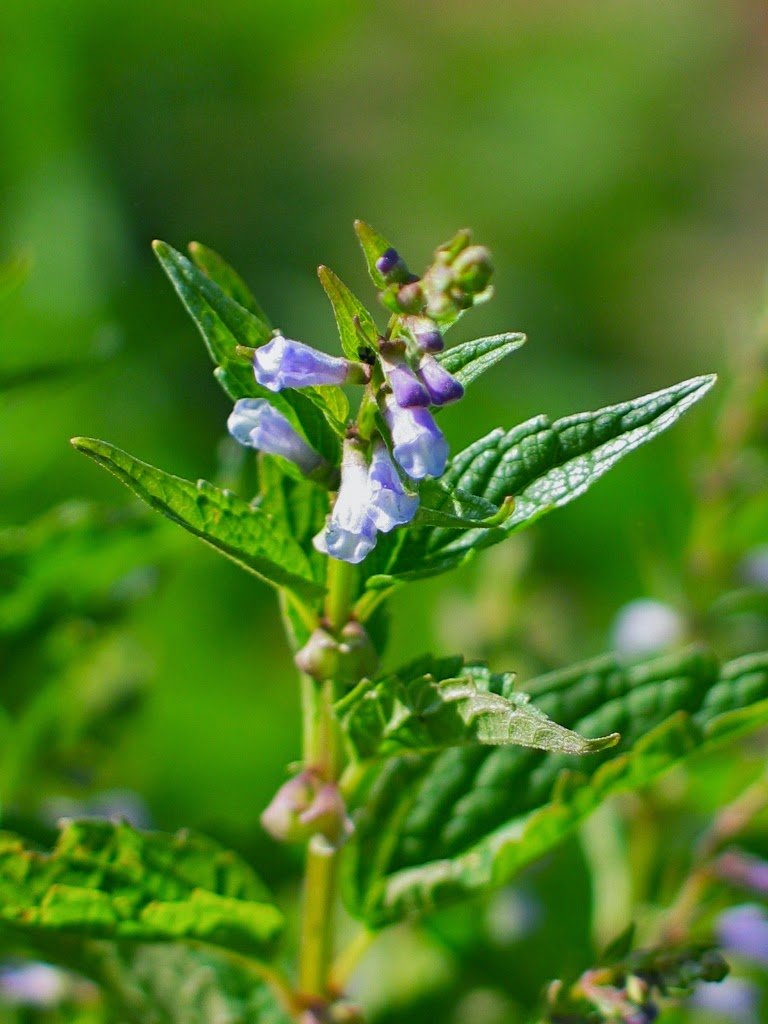 Photo Credit: Liz Butler
Photo Credit: Liz ButlerSkullcap Side Effects
Skullcap side effects are rare and it is considered a safe herb that can be used by most people.
Can you use skullcap while pregnant? The Botanical Safety Handbook says there is no evidence that skullcap is contraindicated in pregnancy and lactation but safety has not been proven.
A few decades ago skullcap was wrongly accused of causing liver damage. We now attribute these claims to adulterated herbs. As always, it’s important to buy your herbs from reputable sources. (I buy most of my herbs from Mountain Rose Herbs because I know they independently test their herbs for contaminants.)
In the late 1980’s several disturbing cases of purported skullcap-induced hepatotoxicity were reported (DeSmet 1997). In each case the products used were multi-herb formulas, and each contained what was purported to be skullcap. However, none were investigated for content and the botanical germander (also known as pink skullcap; Teucrium canadense), a known hepatotoxin has been a relatively common adulterant of the skullcap market for decades and persists today. - AHP Monograph
Botanically Speaking
American Skullcap is a perennial herb that likes to grow in wet places such as near marshes, streams, and other damp areas.
It grows from 60-80 centimeters in height and produces purple flowers that grow up the side of one stem from the leaf axils.
This member of the mint family is not aromatic.
Here is the range map for Scutellaria lateriflora (sometimes called American Skullcap).
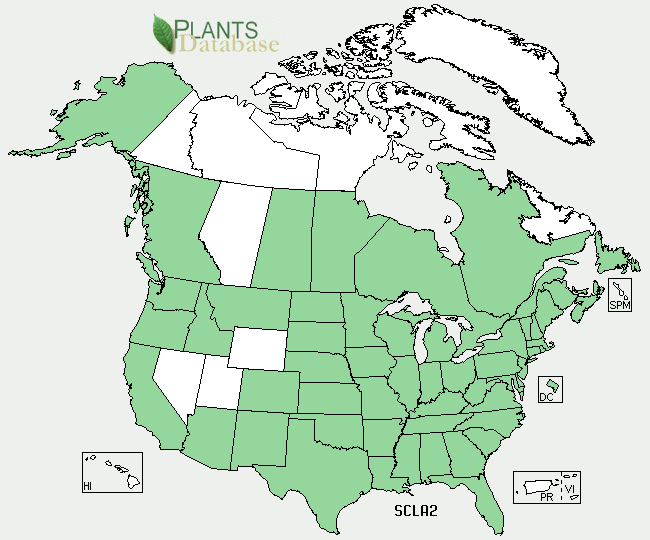
The
Skullcaps (Scutellaria spp.) have a distinctive feature making them
easier to identify. There is a distinctive cap (generally called a
‘protuberance’) on the upper side of the calyx (see photo). This part
has given them both their genus and common name. A ‘scute’ is a plate or
scales, similar to those found on lizard, alluding to the protuberance,
as is the name skullcap.
- 7Song, Plant Healer Magazine 11
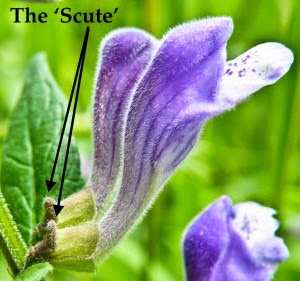 Photo Credit: 7Song
Photo Credit: 7SongDifferent Scutellaria Species
While Scutellaria lateriflora often gets most of the attention, many different species within the Scutellaria genus are used in similar ways, including S. galericulata, S. canescens, S. cordifolia. and others.
Baical Skullcap (Scutellaria baicalensis) is a Chinese medicinal that is in the same genus but is used differently. It is a powerful anti-inflammatory and antiviral herb that is commonly used for infections and fevers.
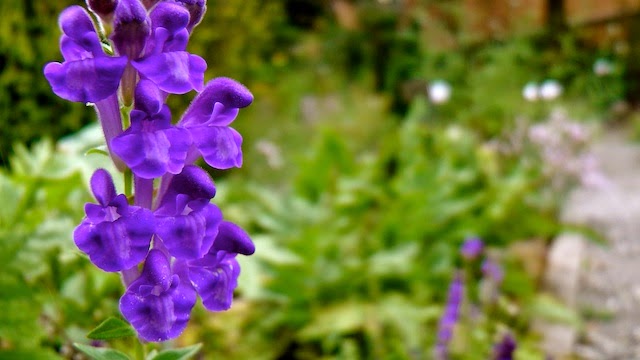 Baical Skullcap (Scutellaria baicalensis)
Baical Skullcap (Scutellaria baicalensis)Wildcrafting Skullcap Herb
Different species of skullcap grow across North America. While these plants aren’t explicitly endangered they could easily be over-harvested since they don’t grow in profusion.
It’s important to keep ethical wildcrafting considerations in mind when harvesting this plant, such as making sure there are well developed stands in the vicinity, leaving healthy populations behind and being respectful of the ecosystem it lives by, avoiding over trampling the area.
Herbalist Darcy Williamson recommends the following harvesting techniques.
Pick the flowering herb, taking only the top 2/3rds of the blooms, leaving the lower ones to form seeds. Be certain to harvest from a large, healthy colony and take only one out of every ten flowers. - Darcy Williamson
Summary of Skullcap Herb
Skullcap herb is a reliable relaxing nervine that is especially beneficial for people who have signs of heat and tension. It can be prepared in a variety of ways with tinctures and as a smoking herb, being most appropriate for acute situations and the strong infusion being best for promoting drowsiness.
Herbalists use skullcap as a simple but also tend to formulate it with other relaxing nervines. Whether used by itself or in herbal formulas, skullcap is a favorite herb for relieving stress and anxiety.
Further Resources

Rosalee is an herbalist and author of the bestselling book Alchemy of Herbs: Transform Everyday Ingredients Into Foods & Remedies That Healand co-author of the bestselling book Wild Remedies: How to Forage Healing Foods and Craft Your Own Herbal Medicine. She's a registered herbalist with the American Herbalist Guild and has taught thousands of students through her online courses. Read about how Rosalee went from having a terminal illness to being a bestselling author in her full story here.
